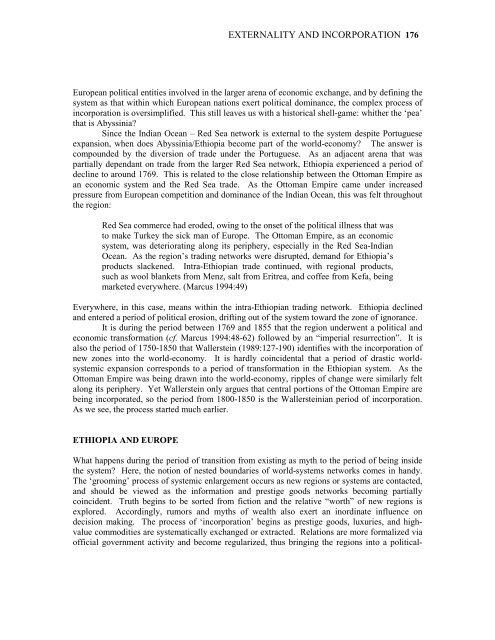Entire Volume 17 issue 1 - Journal of World-Systems Research ...
Entire Volume 17 issue 1 - Journal of World-Systems Research ...
Entire Volume 17 issue 1 - Journal of World-Systems Research ...
Create successful ePaper yourself
Turn your PDF publications into a flip-book with our unique Google optimized e-Paper software.
EXTERNALITY AND INCORPORATION <strong>17</strong>6<br />
European political entities involved in the larger arena <strong>of</strong> economic exchange, and by defining the<br />
system as that within which European nations exert political dominance, the complex process <strong>of</strong><br />
incorporation is oversimplified. This still leaves us with a historical shell-game: whither the ‘pea’<br />
that is Abyssinia?<br />
Since the Indian Ocean – Red Sea network is external to the system despite Portuguese<br />
expansion, when does Abyssinia/Ethiopia become part <strong>of</strong> the world-economy? The answer is<br />
compounded by the diversion <strong>of</strong> trade under the Portuguese. As an adjacent arena that was<br />
partially dependant on trade from the larger Red Sea network, Ethiopia experienced a period <strong>of</strong><br />
decline to around <strong>17</strong>69. This is related to the close relationship between the Ottoman Empire as<br />
an economic system and the Red Sea trade. As the Ottoman Empire came under increased<br />
pressure from European competition and dominance <strong>of</strong> the Indian Ocean, this was felt throughout<br />
the region:<br />
Red Sea commerce had eroded, owing to the onset <strong>of</strong> the political illness that was<br />
to make Turkey the sick man <strong>of</strong> Europe. The Ottoman Empire, as an economic<br />
system, was deteriorating along its periphery, especially in the Red Sea-Indian<br />
Ocean. As the region’s trading networks were disrupted, demand for Ethiopia’s<br />
products slackened. Intra-Ethiopian trade continued, with regional products,<br />
such as wool blankets from Menz, salt from Eritrea, and c<strong>of</strong>fee from Kefa, being<br />
marketed everywhere. (Marcus 1994:49)<br />
Everywhere, in this case, means within the intra-Ethiopian trading network. Ethiopia declined<br />
and entered a period <strong>of</strong> political erosion, drifting out <strong>of</strong> the system toward the zone <strong>of</strong> ignorance.<br />
It is during the period between <strong>17</strong>69 and 1855 that the region underwent a political and<br />
economic transformation (cf. Marcus 1994:48-62) followed by an “imperial resurrection”. It is<br />
also the period <strong>of</strong> <strong>17</strong>50-1850 that Wallerstein (1989:127-190) identifies with the incorporation <strong>of</strong><br />
new zones into the world-economy. It is hardly coincidental that a period <strong>of</strong> drastic worldsystemic<br />
expansion corresponds to a period <strong>of</strong> transformation in the Ethiopian system. As the<br />
Ottoman Empire was being drawn into the world-economy, ripples <strong>of</strong> change were similarly felt<br />
along its periphery. Yet Wallerstein only argues that central portions <strong>of</strong> the Ottoman Empire are<br />
being incorporated, so the period from 1800-1850 is the Wallersteinian period <strong>of</strong> incorporation.<br />
As we see, the process started much earlier.<br />
ETHIOPIA AND EUROPE<br />
What happens during the period <strong>of</strong> transition from existing as myth to the period <strong>of</strong> being inside<br />
the system? Here, the notion <strong>of</strong> nested boundaries <strong>of</strong> world-systems networks comes in handy.<br />
The ‘grooming’ process <strong>of</strong> systemic enlargement occurs as new regions or systems are contacted,<br />
and should be viewed as the information and prestige goods networks becoming partially<br />
coincident. Truth begins to be sorted from fiction and the relative “worth” <strong>of</strong> new regions is<br />
explored. Accordingly, rumors and myths <strong>of</strong> wealth also exert an inordinate influence on<br />
decision making. The process <strong>of</strong> ‘incorporation’ begins as prestige goods, luxuries, and highvalue<br />
commodities are systematically exchanged or extracted. Relations are more formalized via<br />
<strong>of</strong>ficial government activity and become regularized, thus bringing the regions into a political-





